TRT and Fertility: Does Testosterone Therapy Make You Infertile?
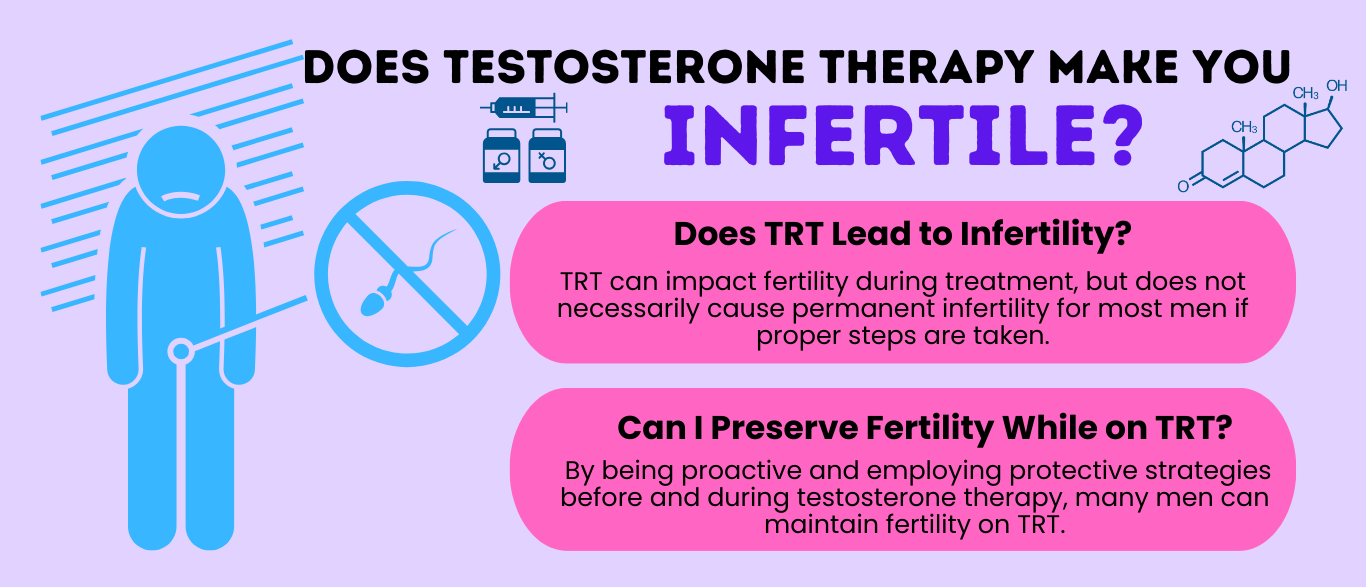
If you’re considering testosterone replacement therapy (TRT) but have concerns about how it might impact your fertility, you’re not alone. It’s one of the biggest concerns men have about starting this treatment. The good news is, while TRT can temporarily affect sperm production and fertility, it doesn’t have to be a permanent roadblock to your family planning goals. With the right approach and precautions, you can preserve your fertility while benefiting from testosterone therapy.
In this comprehensive guide, we’ll dive deep into the relationship between TRT and fertility, separating facts from myths and giving you a clear game plan for managing both.
Does TRT Lead to Infertility?
The short answer is that TRT can impact fertility during treatment, but does not necessarily cause permanent infertility for most men if proper steps are taken.
Can I Preserve Fertility While on TRT?
Absolutely. By being proactive and using certain protective strategies before and during testosterone therapy, it’s very possible for many guys to maintain their fertility while on TRT. We’ll dive into those key tactics in just a bit.
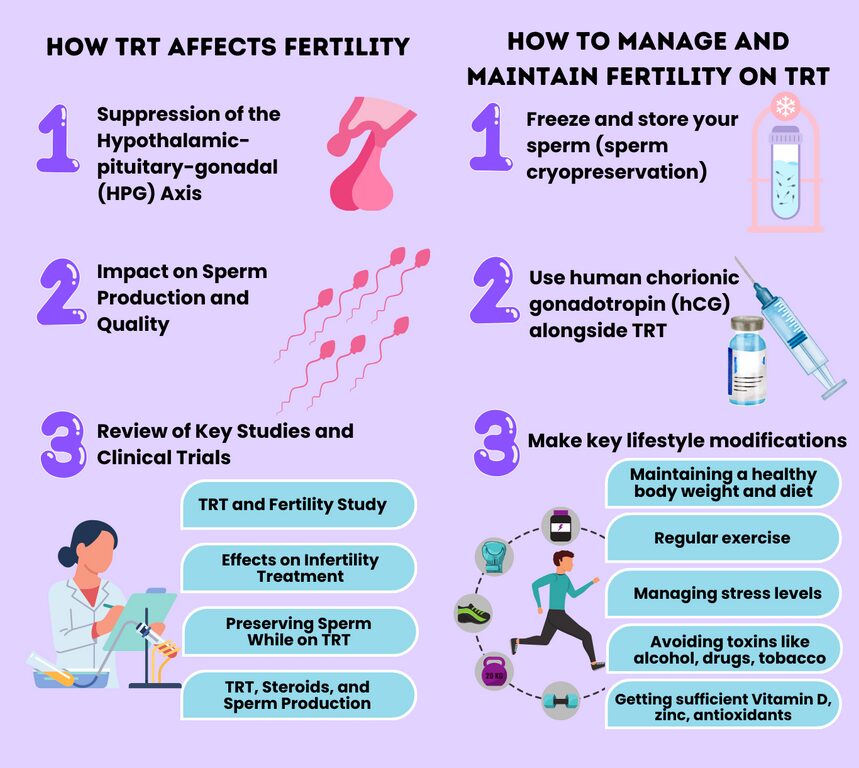
How TRT Affects Fertility
To understand how TRT influences fertility, it’s important to first look at some of the key mechanisms at play:
1. Suppression of the Hypothalamic-pituitary-gonadal (HPG) Axis
When you start taking supplemental testosterone through TRT, it basically tricks your body into thinking, “Hey, we’ve got enough of this hormone already.” This shuts down the normal biological pathways (the hypothalamic-pituitary-gonadal axis) that regulate your natural testosterone production. [1]
With this HPG axis suppressed, your brain stops giving the signal to your testes to make testosterone. And since sperm production (spermatogenesis) relies on that same signaling process, your sperm count takes a nosedive too. [2]
2. Impact on Sperm Production and Quality
Numerous studies have shown TRT can lead to lower concentrations of sperm in semen, reduced sperm motility (ability to swim), and more abnormally shaped sperm cells. The degree can vary from guy to guy based on factors like age, dosage, and how long you’re on treatment.
But in general, most men experience some decline in overall semen quality while actively going through testosterone therapy as those sperm-making factories in the testes get dialed down. [3]
3. Review of Key Studies and Clinical Trials
Let’s look at some of the specific data and clinical trials exploring TRT’s effects:
- TRT and Fertility Study: A review looked at many articles from the past to understand how TRT affects men’s ability to have kids. It found that adding testosterone from outside can stop the body from making its own sperm. However, there are ways to help men still have kids while getting the benefits of TRT, like using certain medicines alongside TRT.[4]
- Effects on Infertility Treatment: This study focused on 20 men who had problems with sperm production after using TRT for issues like low sex drive or erection problems. After stopping TRT, their sperm counts improved, showing that while TRT can interfere with making sperm, this might be reversible.[5]
- Preserving Sperm While on TRT: Another research found that giving a hormone called hCG along with TRT could keep sperm production going. In the study, men continued to produce sperm and some were able to help their partners get pregnant while on this combined treatment.[6]
- TRT, Steroids, and Sperm Production: This article discusses how using TRT or steroids can stop sperm production because of how they affect the body’s hormone balance. But, it also talks about how understanding this process can help manage and potentially reverse the effects, so men can still have children.[7]
These studies show that while TRT can impact a man’s fertility by affecting sperm production, there are strategies and treatments that can help manage or mitigate these effects.
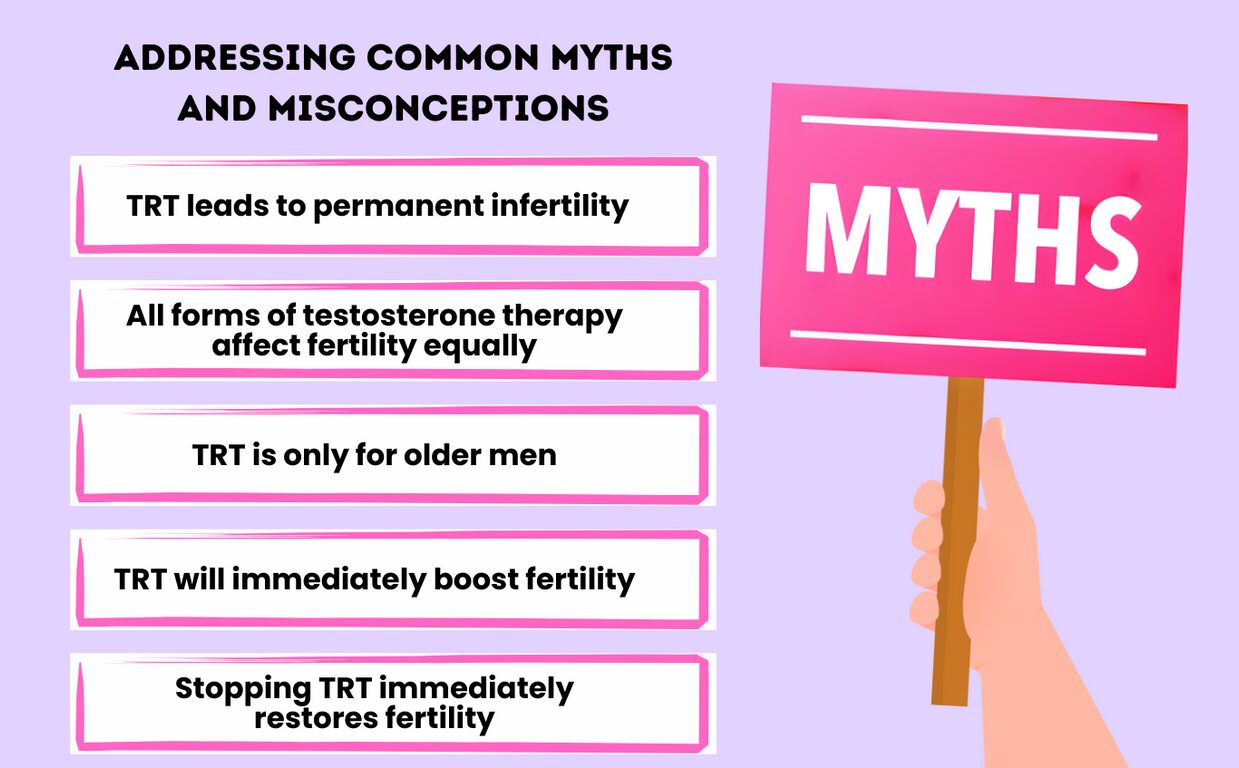
Addressing Common Myths and Misconceptions
When it comes to TRT and fertility, there are several persistent myths and misconceptions that deserve to be addressed:
Myth 1: TRT leads to permanent infertility
For most men, any fertility issues caused by testosterone therapy are reversible once you stop treatment and allow natural testosterone production to restart. While there may be exceptions for guys with pre-existing fertility problems, permanent sterility is not an inevitable outcome. [8]
Myth 2: All forms of testosterone therapy affect fertility equally
Not all TRT protocols carry the same fertility risks. For example, using human chorionic gonadotropin (hCG) along with testosterone can help prevent suppression of spermatogenesis and better preserve fertility during treatment. [9]
Myth 3: TRT is only for older men
While low testosterone levels become more prevalent with age, younger men can absolutely experience conditions like hypogonadism or other disorders that warrant the need for testosterone therapy as well. TRT isn’t solely reserved for men of advanced age. [10]
Myth 4: TRT will immediately boost fertility
Taking testosterone doesn’t automatically make a man more fertile. While it can increase sex drive and performance, TRT alone will not directly improve sperm quality or cure underlying causes of male infertility. [10]
Myth 5: Stopping TRT immediately restores fertility
Be patient – it can take several months for your body’s natural testosterone and sperm production to fully rebound after discontinuing testosterone therapy. Recovery of optimal semen quality may take 6-12 months or longer in some cases. [11]
How to Manage and Maintain Fertility on TRT
If safeguarding your fertility is a priority while undergoing testosterone replacement therapy, there are several proactive steps you can take:
1. Freeze and store your sperm (sperm cryopreservation)
One of the best ways to protect your future fertility before starting TRT is to bank healthy sperm samples through cryopreservation. This involves producing multiple semen samples that get frozen and stored for potential use with assisted reproductive techniques down the road, if needed.
Having a sperm reserve allows you to proceed with testosterone therapy with peace of mind, knowing you have healthy, viable sperm preserved should issues conceiving arise later. [12]
2. Use human chorionic gonadotropin (hCG) alongside TRT
Human chorionic gonadotropin (hCG) is a medication that can be prescribed in conjunction with testosterone therapy. HCG helps mimic the role of luteinizing hormone (LH), which signals the testes to remain active and continue producing sperm.
By incorporating HCG into your TRT protocol, it’s possible to prevent the complete shutdown of spermatogenesis that can otherwise occur with testosterone therapy alone. This allows many men to maintain at least partial sperm production. [13]
3. Make key lifestyle modifications
Certain healthy lifestyle practices can optimize your body’s environment for sperm production and overall fertility, whether on TRT or not.
These include:
- Maintaining a healthy body weight and diet
- Regular exercise
- Managing stress levels
- Avoiding toxins like alcohol, drugs, tobacco
- Getting sufficient Vitamin D, zinc, antioxidants
While lifestyle factors alone can’t entirely counter the fertility effects of TRT, making positive changes in conjunction with other protective measures can provide complementary benefits.
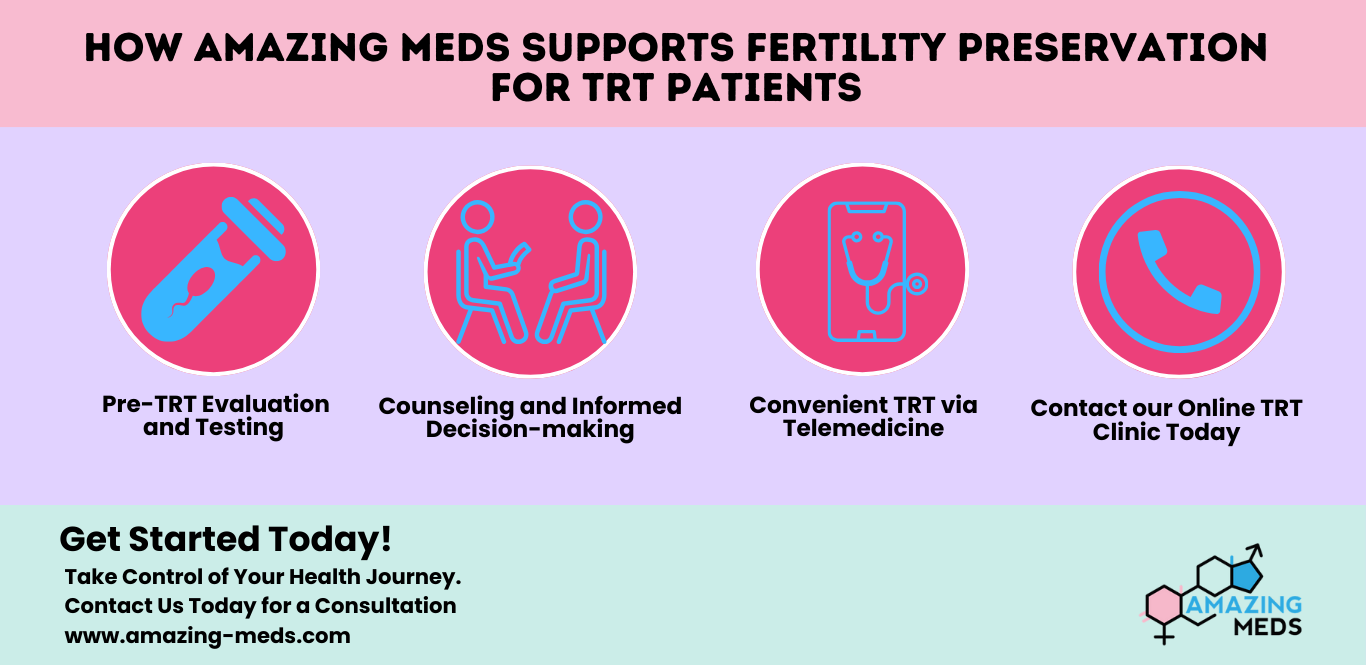
How Amazing Meds Supports Fertility Preservation for TRT Patients
At Amazing Meds, we understand the importance of protecting your fertility goals and family planning options for the future. That’s why our experienced medical team takes a proactive, personalized approach:
1. Pre-TRT Evaluation and Testing
Before initiating any testosterone therapy, our trained nurse practitioners will carefully evaluate your current fertility status.
This involves reviewing key fertility biomarkers like:
- Semen analysis
- Reproductive hormone levels (LH, FSH, Prolactin)
- Testicular exam
We’ll also discuss your motivations for seeking TRT as well as your plans and timeframe for attempting pregnancy.
2. Counseling and Informed Decision-making
Our medical staff will take the time to thoroughly counsel you on the pros and cons of TRT, including the potential fertility impact of undergoing testosterone replacement therapy. We’ll explain the advantages and limitations of protective strategies like sperm freezing or incorporating HCG.
You’ll be empowered to make a fully informed decision about which approach aligns best with your specific priorities and readiness to start/expand your family.
3. Convenient TRT via Telemedicine
If you decide to move forward with testosterone therapy after your evaluation, Amazing Meds makes it easy with our online clinic programs. We can consult with you remotely, develop a customized TRT protocol, and have medications discreetly shipped right to your door.
4. Contact our Online TRT Clinic Today
We aim to make key fertility services like semen analysis, sperm cryopreservation, and supplements easily accessible and affordable for our TRT patients. Transparent pricing and flexible payment options are provided.
If you’re exploring TRT but have concerns about impacts on fertility, the first step is to get an evaluation from our caring, experienced team. Contact us today to start a conversation about your needs and goals.
We’re here to be your trusted partner every step of the way.
Frequently Asked Questions About TRT & Fertility
What is Testosterone Replacement Therapy (TRT), and who needs it?
Testosterone replacement therapy involves supplementing low levels of the hormone testosterone that the body produces naturally. TRT is generally taken by men diagnosed with conditions like:
- Hypogonadism (very low testosterone)
- Certain pituitary or hypothalamic disorders
- Side effects from cancer treatments
- Type 2 diabetes
- Obesity
- HIV/AIDS
- Chronic health issues negatively impacting testosterone
- Common symptoms of low testosterone that are improved with TRT include low libido, fatigue, reduced muscle mass, irritability, and difficulty concentrating.
How exactly does TRT impact sperm production and quality?
When you introduce external testosterone into your body through therapy, it signals to your brain that testosterone levels are already sufficient. This shuts down the normal biological pathways (HPG axis) by which:
- Your brain signals your pituitary gland
- The pituitary tells your testicles
- To produce testosterone and sperm through spermatogenesis
With this axis suppressed, your testes no longer receive instructions to make sperm. As a result, semen parameters like sperm concentration, motility and morphology typically decline over the course of TRT.
Are the fertility effects caused by TRT reversible or irreversible?
For most men, the effects of testosterone therapy on fertility are reversible rather than permanent. Once TRT is discontinued, studies show the HPG axis is able to “restart” and male fertility begins recovering within a few months.
However, the degree and timeline for reversibility can vary based on factors like:
- Age
- Dosage and duration of prior TRT
- Presence of any underlying fertility issues
Some men with preexisting infertility may experience more difficulty regaining optimal semen quality after stopping TRT. But for the majority, any suppression of sperm production is a temporary effect.
What are my main options for preserving fertility during TRT?
The two primary strategies for maintaining fertility potential while on testosterone therapy are:
- Freezing and banking healthy sperm samples before starting TRT, through cryopreservation/sperm freezing services. This ensures you have viable sperm preserved.
- Taking human chorionic gonadotropin (HCG) injections alongside testosterone therapy. HCG helps keep the testes active and avoids a complete shutdown of sperm production.
Other helpful measures can include lifestyle modifications and carefully timing TRT cycles around your family planning calendar.
After stopping TRT, how long does it typically take for fertility to be restored?
The timeline can vary, but many men show signs of resuming sperm production around 3-4 months after discontinuing testosterone therapy. Semen analysis at this stage often reveals increasing sperm concentrations and motility compared to during active treatment.
However, it frequently takes 6-12 months or longer for semen parameters like sperm count, morphology and DNA integrity to fully recover to their pre-TRT baseline levels. Age and duration of prior testosterone use can be factors affecting the pace of full fertility restoration.
What are potential signs that TRT is negatively impacting my fertility?
Some indicators that your current testosterone therapy protocol may be suppressing semen quality and fertility include:
- Decreased semen volume
- Thinner or more watery semen consistency
- Absence of sperm detected on semen analysis
- Changes in semen odor
- Erectile dysfunction or difficulty with ejaculation
It’s advisable to get regular semen analyses to monitor and track any concerning shifts in your sperm health markers over the course of TRT.
Does the length of time I’m on TRT affect fertility outcomes?
One study found that both the duration of testosterone therapy (TRT) and the age of the individual are significant factors that affect the time it takes for sperm count to return after stopping TRT. [5]
Basically, if you’re on testosterone replacement therapy (TRT) for a while or if you’re older, it might take longer for your sperm count to bounce back after you stop TRT and start treatments like hCG and SERMs. Longer TRT use and being older can make it tougher for sperm to recover within 6 to 12 months after stopping TRT.
How exactly does Amazing Meds approach fertility for TRT patients?
At Amazing Meds, we follow an individualized, proactive process that involves:
- Thoroughly evaluating your fertility status through semen analysis, physical exam and bloodwork before initiating TRT.
- Providing in-depth counseling on how testosterone therapy may impact your fertility now and in the future based on your specific diagnosis and family planning goals.
- Educating you on all available options for maintaining fertility during TRT, such as sperm freezing, HCG therapy, strategic timing of treatment cycles etc.
- Developing a customized treatment protocol that incorporates whichever fertility preservation methods align with your preferences and priorities.
- Offering convenient and affordable services like semen analysis, sperm cryopreservation, and online access to supplemental fertility medications.
- Ongoing monitoring and adjustments to your TRT plan as needed based on follow-up semen analyses and your readiness to attempt conception.
Our aim is to be a supportive partner in helping you navigate both your testosterone optimization and fertility needs through careful planning and open communication.
What specific steps does Amazing Meds take for personalized TRT treatment planning?
Before prescribing any testosterone therapy, our highly trained medical staff will conduct a detailed evaluation taking into account:
- Your current testosterone levels (total, free, bioavailable) from bloodwork
- Results from a comprehensive physical exam and medical history review
- Semen analysis to establish your baseline fertility status
- Discussion of your goals, motivations and timeframe for family planning
- Assessment of any medications, health conditions or lifestyle factors that could impact your response to treatment
Based on this full picture, our practitioners will develop a personalized TRT protocol tailored specifically to your unique diagnosis, hormone profile, fertility needs and personal preferences. This includes determining the ideal:
- Testosterone formulation (injections, gels, pellets etc.)
- Dosage and administration schedule
- Whether adjunctive medications like HCG should be incorporated
- Any beneficial lifestyle/nutrition adjustments to consider
- Frequency of follow-up testing and monitoring
We avoid a one-size-fits-all approach, instead crafting treatment plans centered around your biochemistry and life circumstances for optimal safety and results.
Where can I turn for more guidance on TRT and fertility?
If you have any other questions or need further support navigating testosterone therapy and fertility preservation, our compassionate team at Amazing Meds is just a call or click away.
You can reach out to us to book a consultation with one of our highly experienced nurse practitioners specializing in male hormone optimization and reproductive health. We’ll be happy to thoroughly address any other concerns you might have.
Amazing Meds is committed to being your trusted resource and partner through every step of this journey. Our goal is to help you feel empowered in weighing your options and making informed decisions so you can boost your vitality while still protecting your family-building dreams for the future.
Testosterone Replacement Therapy and Fertility: A Visual Summary
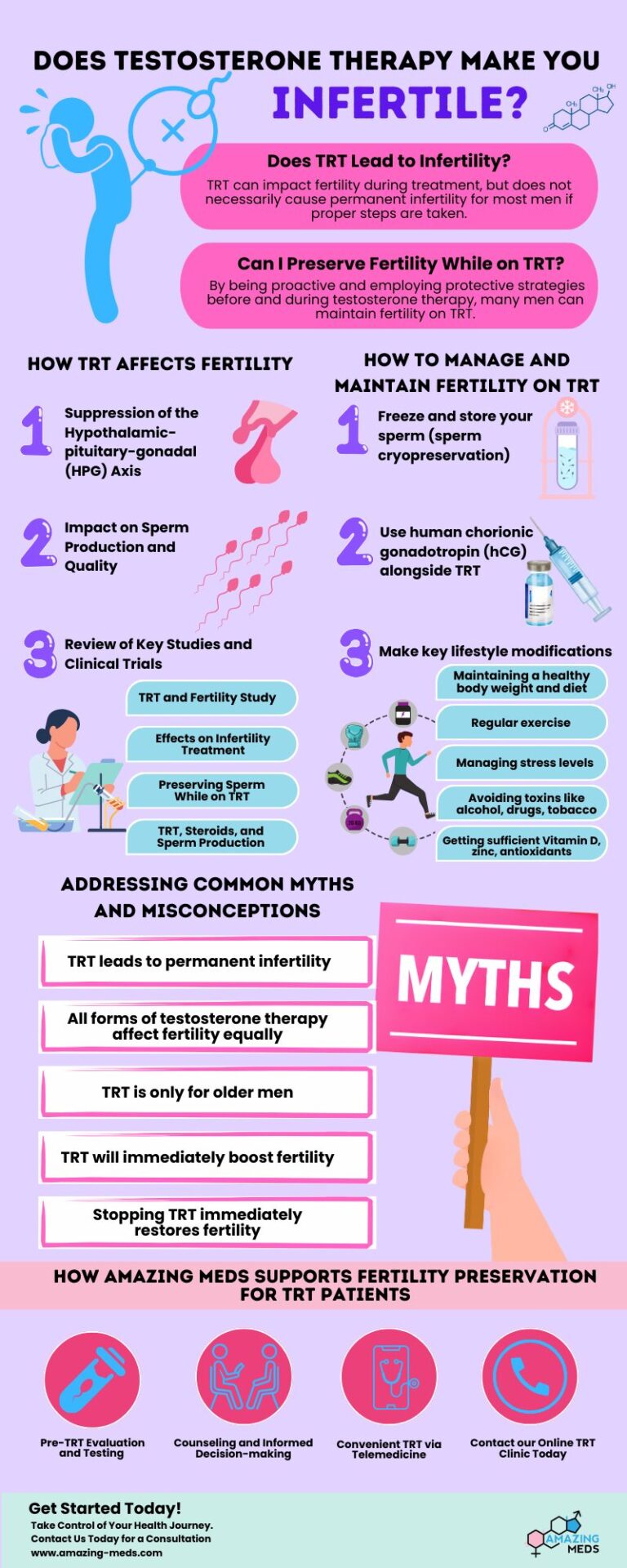
References:
- Borate GM, Meshram A. Cryopreservation of Sperm: A Review. Cureus. 2022 Nov 12;14(11):e31402. doi: 10.7759/cureus.31402. PMID: 36523734; PMCID: PMC9744399.
- Lee JA, Ramasamy R. Indications for the use of human chorionic gonadotropic hormone for the management of infertility in hypogonadal men. Transl Androl Urol. 2018 Jul;7(Suppl 3):S348-S352. doi: 10.21037/tau.2018.04.11. PMID: 30159241; PMCID: PMC6087849.




